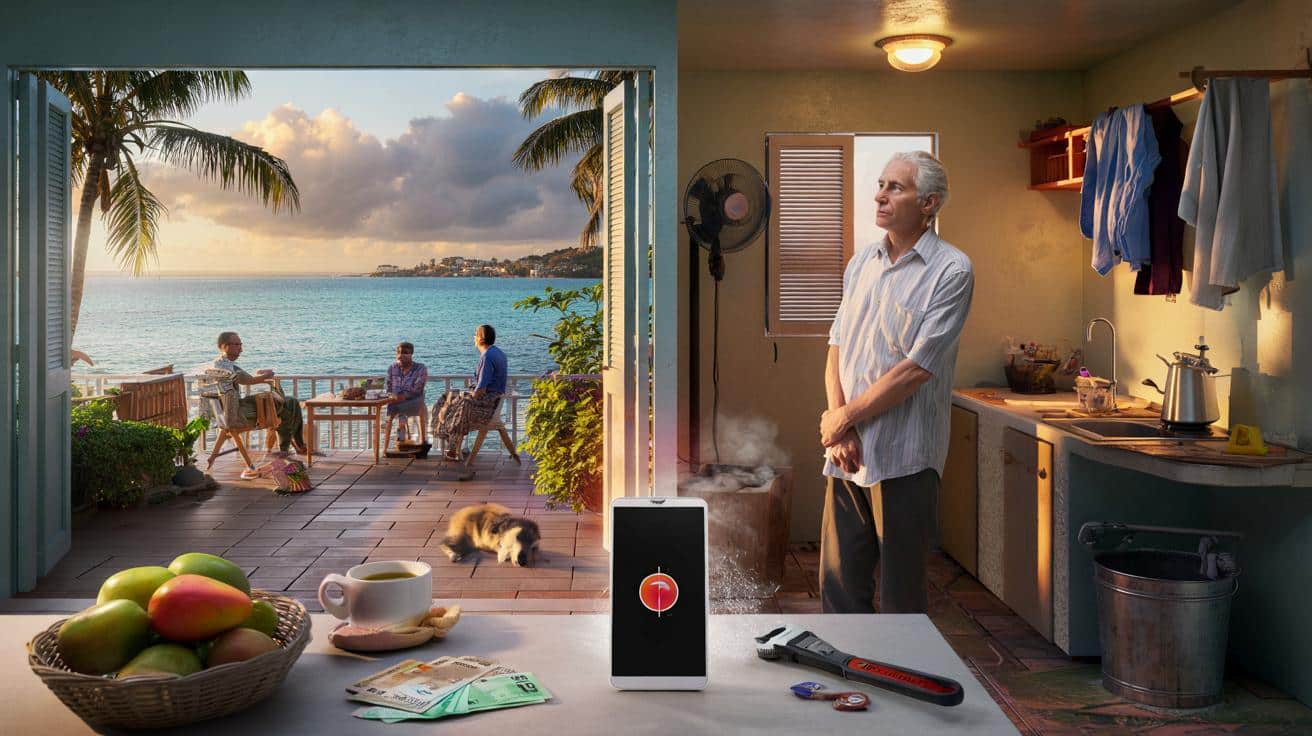The coffee was cheap, the mangoes were indecently sweet, and the Wi‑Fi almost behaved until the kettle clicked on. I thought the ocean would silence everything. The first Monday, I padded to the shop in sandals, bought bread that tasted of salt and sunshine, and smiled at a stray dog that had decided we were friends. Then the electricity hiccupped, the bank app froze, and the landlord messaged about “the new tourist tax”. Paradise blinked.
The postcard and the price tag
On day three, I noticed the way the air clung to the walls. Shirts stayed damp on the chair. The lift in our building took its time, like a retiree on a warm pavement, and when it reached our floor it sighed. There’s beauty in slowness, until you’re holding a bin bag and the corridor smells like a lesson. The dream of retiring abroad isn’t false. It’s just missing the Tuesday bits.
I kept a scribbled notebook: rent, SIM card, bus fares, two coconuts, one cheeky bottle of rosé. The market tomatoes were 40p; the imported cheddar was a fiver. We hired a fan, then bought the fan when the first hot night turned into a joke at 3am. A plumber came for the sink and left with our patience, returning the next afternoon with a cousin and a new tap. My “paradise budget” was off by roughly a third, which is another way of saying the ocean doesn’t pay your bills.
What catches you out isn’t the big ticket. It’s the dozens of little tolls you don’t see on holiday — the admin and the friction and the things you assumed would be simple. Currency swings turn a latte into a mood. You start to learn the “paradise tax”: biscuits you love cost more, avocados less, and every Western habit carries a surcharge. **Retirement isn’t a long holiday.** It’s ordinary life in a different climate, with palm trees and new passwords.
What actually works when you test‑lift your life abroad
Give yourself a working month, not a lounging one. Use the public clinic once for something tiny, ride the bus at 9pm, and buy whatever you’d buy in a normal week back home — tinned tomatoes, paracetamol, a lightbulb. **Treat your trial month like a dress rehearsal, not a honeymoon.** Set a local bank card up, pay a bill in person, and ask three neighbours where they buy their veg. You learn more from a midweek shop than from a sunset.
We’ve all had that moment when a place feels perfect until the day is ordinary. That’s the hour to test your future. Don’t bounce between beachy Airbnbs that would never be your long‑term postcode. Ask about damp, noise after midnight, and who looks after pets when you fly home. Try one social thing that isn’t built for tourists — a walking group, a choir, a rubbish‑pick on Saturday. Let’s be honest: nobody really does that every day. If it feels like work, that’s useful data, not a failure.
I kept a simple rule for decision days: if three locals give the same advice, follow it.
“If you can enjoy the boring days here, you’ll enjoy the brilliant ones twice over.”
Then I made myself a tiny checklist to dodge wishful thinking:
- What does a stormy Tuesday sound like at 6am?
- Can I get to a decent GP in under 30 minutes without a car?
- What’s the price of milk, lentils, toothpaste and a bus pass?
- How strong is the internet when everyone’s streaming football?
- How many cashpoints are in walking distance — and who charges?
- What breaks in the first week of humidity?
Not glamorous. Useful.
The choice you make after the dream
A month won’t make you local, but it will show you where your edges are. The lesson wasn’t “don’t move”. It was pace and shape. Renting beats rushing to buy. A visa you can renew calmly beats a complicated leap. The best apartment is the one that gives you neighbours, not just a view. **Paradise is lovely, but a plan is lovelier.** You can live by the sea and keep a little foothold back home, with a friend holding a spare key and a GP who still knows your name. The real victory is designing a life that lets you miss things without breaking.
| Point clé | Détail | Intérêt pour le lecteur |
|---|---|---|
| Cost of ordinary days | Track staples, transport, healthcare visits and small fixes for one full month | Build a realistic budget that won’t collapse at the first power cut |
| Community over coastline | Test one local club or class and note how easy it is to make one new friend | Reduce loneliness risk and find a support network faster |
| Paperwork reality | Dry‑run a visa query, clinic registration, and paying a utility bill | Avoid surprises that can derail a move or drain savings |
FAQ :
- How much money do I really need to retire abroad comfortably?Build a bottom‑up budget from a test month: housing, healthcare, food, transport, and a 15–20% buffer for currency swings and repairs. Include two return flights home a year and one “unexpected” line for bureaucratic fees.
- Should I rent or buy if I plan to stay long term?Rent first for at least 12 months. You’ll learn the microclimate, noise, neighbours and bureaucracy before committing capital. Buying can make sense later, once you know the streets you love and the pitfalls you don’t.
- What about healthcare when I’m no longer on holiday insurance?Price a private plan or local scheme that covers chronic conditions and evacuation. Do a dummy visit to a clinic to understand waits, language, and costs. Keep medical files scanned and translated where relevant.
- Will I feel lonely, and how do I handle that?You might, especially after the first glow fades. Start building routine social anchors — weekly markets, a gym class, volunteering, language lessons. One reliable plan in your diary beats five vague “we should grab coffee” promises.
- Is it better to pick a low‑cost country or one where I speak the language?Both matter, and neither makes up for the other entirely. If costs are low but admin is impenetrable, stress climbs. If language is easy but prices bite, money nags. Aim for the best blend your savings and patience can carry.









Brilliant piece — the line about “paradise tax” and treating a trial month like a dress rehearsal really landed. I’ve been romanticizing beach life, but your checklist (stormy Tuesday, bus pass, internet at football time) is gold. This is definitly the sober guide I needed.
Curious: how did you model currency risk beyond the 15–20% buffer? If your income is in GBP but rent is in euros or pesos, do you hedge or just accept swings? I worry the “two flights home” line item gets obliterated when exchange rates go feral.